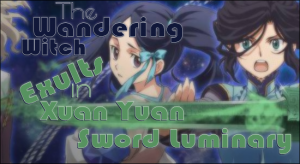The Wandering Witch Exults in Xuan Yuan Sword Luminary

Welcome, all, again. A new viewing season has begun, and this one seems to offer many more selections to my taste. In fact, I’m very excited about two shows in particular: Goblin Slayer (reviewed on my site anotheranimereview.com) and Xuan Yuan Sword Luminary. While both combine action/adventure and fantasy, each also delves into its subject matter in unexpectedly realistic terms, and I simply cannot convey how appreciative I am. What I think I find most fascinating about these shows is how they derive and subsequently explore subtle character development arising from the most horrendous of circumstances. Loyalty and love seem to be the hinges upon which the story of Xuan Yuan Sword Luminary turns, but I tremble to think what torturous interpretations might be forced upon them! The narrative progression is just so strong that each new episode has been like watching panicked swimmers tiring themselves against a fierce current–I finish just as exhausted, I think, as they. That said, I admire a show that can make its viewers feel both the emotional and visceral flows of its story, and this one delivers!

Seemingly set in a fictionalized China, Xuan Yuan Sword Luminary has as its catalyst the military expansion of the Taibai Empire. During a campaign, one of the numerous Taibai armies happens upon the encampment of a nomadic tribe and takes advantage of the situation to resupply. In addition, they take a number of these nomads captive to ship home as slaves, then put the rest of the tribe to the sword. Historically speaking, such a fate was not unusual for nomads, whose very mobility made them unmanageable and thus suspect. Nor were nomads normally seen as having the same productive potential as people in farming communities, who raised and supplied food, or those in settled towns, whose commerce provided market and tax revenue. In fact, despite long traditions of self-sufficiency, nomads were often viewed as societal parasites, particularly by governments and other cultural institutions. (Still, being something of a history buff, I tend to expect rape to accompany rapine, so the single-minded slaughter portrayed in episode 2 struck me as especially odd and–in this specific instance–unrealistic.) Three childhood friends survive this attack: Pu Zhao, taken as a slave, and the sisters Yin and Ning, whom he believes dead. Yin is the elder sister, upon whom Pu Zhao had a crush, while Ning is the younger sister who was in love with him; it was her love for Zhao that caused Ning to lose her arms, holding onto him and pulling against his captors. Fate has even crueler cuts to come.

Pu Zhao is taken to the Imperial capital, where slaves build the [CGI] automaton constructs that prove so formidable in battle. (These giant machines give Taibai armies a superiority on the field very reminiscent to that enjoyed by German Panzer divisions against Polish cavalry and infantry at the opening of World War II; there is simply no defense against them.) Pu Zhao’s native curiosity and intelligence attract the attention of the Chief Engineer, who encourages his studies, while his sensitive yet protective nature sees him befriend a lonely young girl who turns out to be the new Empress Long Cheng. Meanwhile, Yin and Ning have been roaming the rather desolate countryside as outdoor performers, witnessing repeated outrages against civilians by the Taibai military. But while scrounging supplies from an abandoned village, Yin accidentally finds an ancient scroll which gives her mastery over both a magical bronze sword and Yun, a mechanical fox spirit, who gifts Ning with functional mechanical arms. Yin uses her new strength to argue for peace, but Little Sister has some scores to settle! These three are each building new lives from the tatters of their shared past, but are on a collision course.

As viewers, we the audience have certain expectations thrust upon us, chief amongst them being the duty of interpretation and the burden of either knowledge or ignorance. Interpretation is as inherent a part of artistic endeavor as is creation, but the burden of knowledge or ignorance is reserved for story, whatever its medium. We are either as ignorant of a character’s situation as is s/he, or we are burdened with knowledge beyond that character’s grasp. In Xuan Yuan Sword Luminary, we watch with deepening foreboding as characters who care deeply about one another unknowingly travel paths that will bring then into inevitable conflict. We are burdened with a foreknowledge of their impending pain and renewed sense of loss. And so we sit, helpless as old, spent gods, watching tragedy play out before us. This might be a Japanese anime based upon a Taiwanese game that’s set in ancient China, but it has a very Greek feel and theatricality to its telling. I think that Sophocles himself might approve.
















iStalk? uStalk!